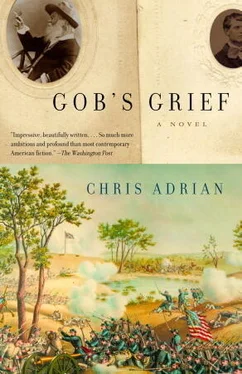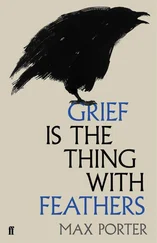Dr. Fie dragged her outside, held her tight by both shoulders and shouted in her face, “Stay here, I will bring him out!” But before he could pass through the door again they were sent flying down the marble steps by an explosion. Maci lay on Fifty-third Street with her leg twisted beneath her, obviously broken, but somehow not very painful. Dr. Fie and Mr. Whitman both lay near her, neither of them moving. There came another explosion, and another, and fire came bursting out of a whole row of windows. A piece of stone came flying down — she watched its whole journey from the house to her head. As she slept she dreamed of a night when her husband had put his finger on the same place the stone hit her and named it for her. “Glabella,” he’d said, and she’d thought how it would be a beautiful name for a daughter.
When she woke, Dr. Fie was sitting on the steps, weeping into his hands. Mr. Whitman had opened his eyes, and was moving his lips, but not making any sound. Maci raised herself on her arms and looked up toward the house, where a figure stood just outside the flaming door, looking indecisive and confused. “Down here!” she called to it, thinking it was Gob. “Come down!” The figure turned at the sound of her voice, and did start down the steps, too slow for a person fleeing a fire.
“Stop your crying, he’s alive!” Maci said to Dr. Fie, but he only wept harder, and as the figure came nearer, she saw that it was not her husband, or even little Pickie. It was a boy older than him, one who wore Gob’s face. Entirely naked, he stepped close and peered at her, trying, she could tell, to recognize her, and then he flinched away, as if he had never seen a lady scream or weep before. “Let me go!” he pleaded. But she held him fast.
“THOMAS,” HIS WIFE CALLED OUT FROM THE OTHER SIDE OF their bed, “it’s past your rising time.”
“I know it,” Tomo said. “I’m on my way.” But he lay in bed awhile longer. His knees and his elbows and his shoulders were so stiff these mornings that he liked to loosen them up some in bed before he tried to rise. He was old for his age, and his joints seemed to be the oldest part of his body.
“Don’t be late,” she said, because she thought he had an appointment across the river, a weekly obligation to teach a class at the medical college. She went back to sleep. Tomo felt blindly for his cane, and when he found it, slowly moved his legs off the side of the bed, and rose with all the speed of a growing plant. He’d slept in a hunch, and now his back did not wish to unbend itself. He walked a little around the room, leaning on furniture as he passed it, and paused by the window to look out at the bridge. Half the windows in the house had a view of it — it was the reason he’d purchased the place. He’d put out his clothes by the window so he could dress there, so he could see the bridge and think how he would soon be on it. It was a weekly ritual with him. Every Saturday he’d take a walk over to Manhattan.
Tomo was one of the first to cross over, when the bridge opened at midnight on May 25, 1883. He was twenty-one years old, still a student and still living with Will, who had taken him in even before his mother and Tennie went away to England in ’76. “Aren’t you coming, Will?” he’d asked, but Will wouldn’t go out of the house that night. “Eventually,” Will said, but Tomo was sure that he never even looked out his window at the incredible display of fireworks.
“I sent my mama a telegram,” he said the next day. “Datelined ‘Brooklyn Bridge.’”
“She’ll be glad of it,” Will said. “You ought to have sent one to Walt.”
“I’ll send one to him, too,” Tomo said, though he did not intend to do that. When he was still a boy, Will would take him to Camden to visit the old poet, a man who pinched Tomo every time he saw him, and demanded kisses like a bearded, bad-breathed aunt. Will went down to see him every year in January, on the anniversary of the stroke that had made an invalid of Mr. Whitman, half-paralyzing him.
They had their breakfast — steak for Tomo, apples and toast for Will — and Tomo talked excitedly of how the bridge was magnificent, of how he had jumped up and down in the middle, expecting it to bounce under him.
“Of course it did not,” Tomo said, and then continued to eat in silence. Moody Will was crying again, and it was best to let him alone when he got this way. When Tomo had returned earlier that morning, Will was sitting in a battered chair and looking down at the crowds walking home underneath the paper lanterns on Fulton Street. “No one remembers,” he said as soon as Tomo came into the room. “Not even you. I think that is the worst thing about it. Walt’ll kick off soon, and then it will be just Maci and I. He never forgot you , did he? He remained inside, when he might have come back out into the world. Why don’t you remember? Shouldn’t you be ashamed, to have forgotten him? And shouldn’t you be ashamed, to have forgotten what he did?”
“I don’t know what you’re talking about, Will,” Tomo said. “Are you talking about Sam? Are you talking about Gob?”
“You should remember,” Will said sadly.
“But I do,” Tomo said. “What sort of person wouldn’t remember his own brother?” He pulled a chair closer to Will’s and put his hand on Will’s knee, thinking of their respective brothers, both dead in the war. He cried a little, too, thinking of Gob’s abbreviated life, but he could not keep up with Will, a champion mourner, and Will’s snuffling sobs turned to voices in Tomo’s head as he drifted to sleep in his chair, thinking again of the illuminations over the bridge.
He had stood under the millions of flashing stars, listening to every ship in the harbor blow its horn, and thought how Will must be standing with his face to a wall, so as not to see even the glimmer in neighboring windows. Next to Tomo, a little boy in a black suit and a porkpie hat was clapping his hands and laughing at the display, at the fountains of gold and silver stars roaring off the towers, and the hundreds of Japanese shells bursting in rapid succession into blue, red, white, and emerald sparks that fell, still incandescent, into the river. “Isn’t it sad?” the boy asked Tomo. “Isn’t it so terribly sad?”
Tomo was always very slow going up the stairs to the promenade. Sometimes he’d stop and lean casually against the rail, unfold the paper that he carried under his arm, and pretend to read. In a little while he’d be able to go on again, up to the top of the stairs, where he always found himself thinking of the people who’d died on the bridge during the big stampede. Every May he’d bring a little wreath over and lay it down to get trampled, too.
It was his custom to stop in the middle of the bridge and look down the river. It was pretty rare, these days, to see anybody jump, or even to read about it in the papers. But Tomo had been there when Odlum made his leap in 1885, and he still remembered very well how he jumped, with one arm raised up over his head, and how his fall was so easy to follow because of the startling red shirt he wore. Tomo had missed Steve Brodie’s supposed midnight jump, which had probably not ever really happened, anyhow, but he had been there in ’87, when a man named Hollow had leaped off wearing a pair of giant canvas wings. Tomo watched as the man glided down to land gently on the surface of the river, just in front of a friendly-looking tug. It plowed over him, crushing his wings, but he lived through that abuse.
“He’s dead!” the little boy had said, next to Tomo. He’d hauled himself up on the railing, and was looking down the river, his face all twisted up in dismay.
“No, child,” Tomo told him. “See there, he’s swimming away in the wake. It’s only his wings that have been injured.”
Читать дальше












